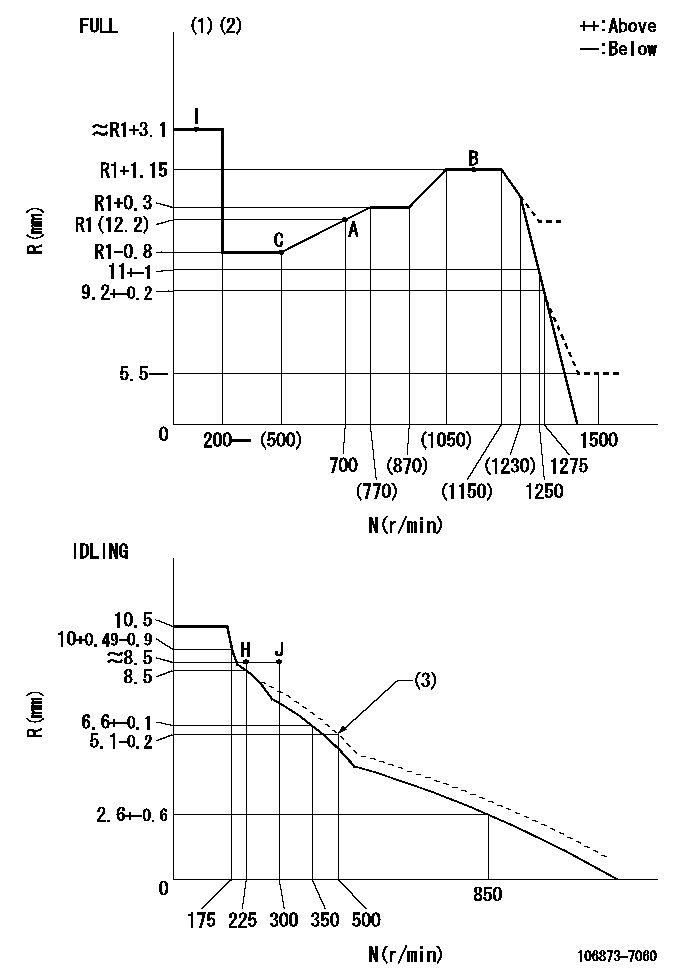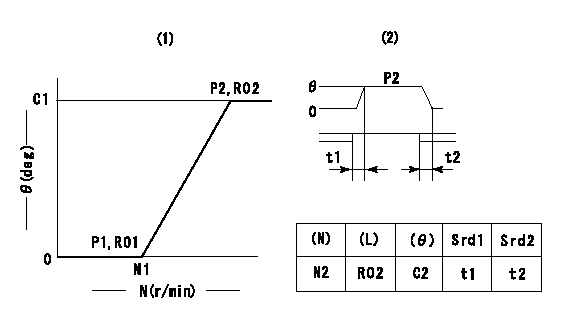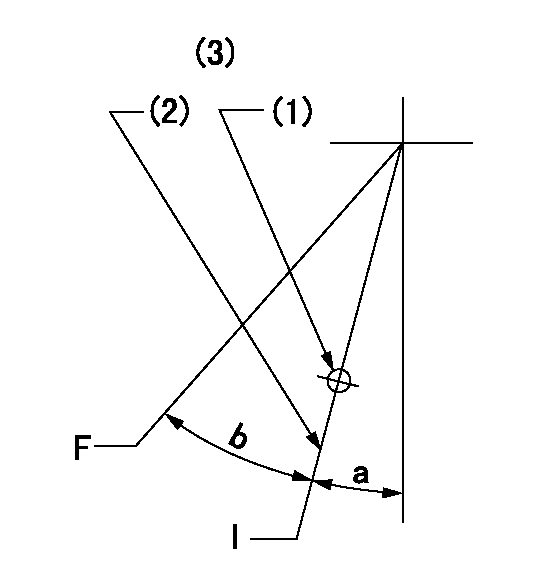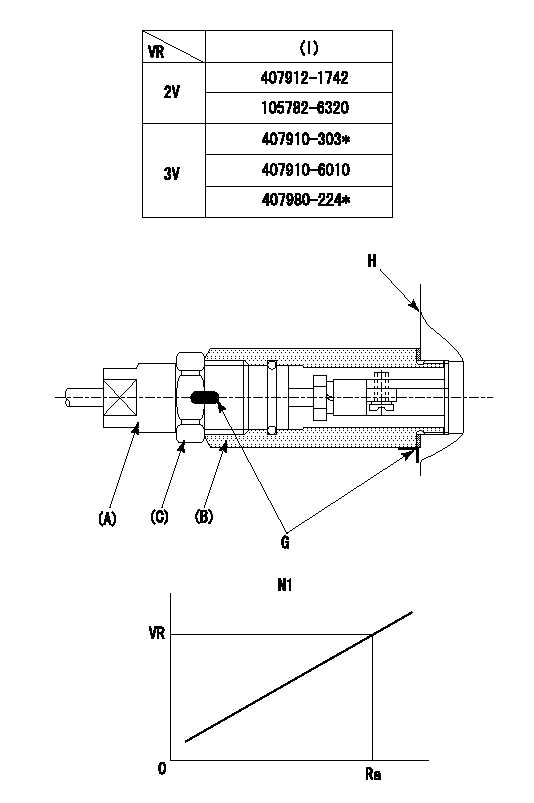Information injection-pump assembly
BOSCH
9 400 618 465
9400618465
ZEXEL
106873-7060
1068737060
MITSUBISHI
ME093423
me093423

Rating:
Service parts 106873-7060 INJECTION-PUMP ASSEMBLY:
1.
_
7.
COUPLING PLATE
8.
_
9.
_
11.
Nozzle and Holder
12.
Open Pre:MPa(Kqf/cm2)
17.7(180)/21.6(220)
14.
NOZZLE
Include in #1:
106873-7060
as INJECTION-PUMP ASSEMBLY
Cross reference number
BOSCH
9 400 618 465
9400618465
ZEXEL
106873-7060
1068737060
MITSUBISHI
ME093423
me093423
Zexel num
Bosch num
Firm num
Name
106873-7060
9 400 618 465
ME093423 MITSUBISHI
INJECTION-PUMP ASSEMBLY
8DC9 K
8DC9 K
Calibration Data:
Adjustment conditions
Test oil
1404 Test oil ISO4113 or {SAEJ967d}
1404 Test oil ISO4113 or {SAEJ967d}
Test oil temperature
degC
40
40
45
Nozzle and nozzle holder
105780-8140
Bosch type code
EF8511/9A
Nozzle
105780-0000
Bosch type code
DN12SD12T
Nozzle holder
105780-2080
Bosch type code
EF8511/9
Opening pressure
MPa
17.2
Opening pressure
kgf/cm2
175
Injection pipe
Outer diameter - inner diameter - length (mm) mm 8-3-600
Outer diameter - inner diameter - length (mm) mm 8-3-600
Overflow valve
131425-0220
Overflow valve opening pressure
kPa
157
123
191
Overflow valve opening pressure
kgf/cm2
1.6
1.25
1.95
Tester oil delivery pressure
kPa
157
157
157
Tester oil delivery pressure
kgf/cm2
1.6
1.6
1.6
Direction of rotation (viewed from drive side)
Right R
Right R
Injection timing adjustment
Direction of rotation (viewed from drive side)
Right R
Right R
Injection order
1-2-7-3-
4-5-6-8
Pre-stroke
mm
3.9
3.85
3.95
Beginning of injection position
Governor side NO.1
Governor side NO.1
Difference between angles 1
Cyl.1-2 deg. 45 44.5 45.5
Cyl.1-2 deg. 45 44.5 45.5
Difference between angles 2
Cal 1-7 deg. 90 89.5 90.5
Cal 1-7 deg. 90 89.5 90.5
Difference between angles 3
Cal 1-3 deg. 135 134.5 135.5
Cal 1-3 deg. 135 134.5 135.5
Difference between angles 4
Cal 1-4 deg. 180 179.5 180.5
Cal 1-4 deg. 180 179.5 180.5
Difference between angles 5
Cal 1-5 deg. 225 224.5 225.5
Cal 1-5 deg. 225 224.5 225.5
Difference between angles 6
Cal 1-6 deg. 270 269.5 270.5
Cal 1-6 deg. 270 269.5 270.5
Difference between angles 7
Cal 1-8 deg. 315 314.5 315.5
Cal 1-8 deg. 315 314.5 315.5
Injection quantity adjustment
Adjusting point
-
Rack position
12.2
Pump speed
r/min
700
700
700
Each cylinder's injection qty
mm3/st.
109
105.7
112.3
Basic
*
Fixing the rack
*
Standard for adjustment of the maximum variation between cylinders
*
Injection quantity adjustment_02
Adjusting point
Z
Rack position
8.5+-0.5
Pump speed
r/min
510
510
510
Each cylinder's injection qty
mm3/st.
16
13.6
18.4
Fixing the rack
*
Standard for adjustment of the maximum variation between cylinders
*
Injection quantity adjustment_03
Adjusting point
A
Rack position
R1(12.2)
Pump speed
r/min
700
700
700
Average injection quantity
mm3/st.
109
108
110
Basic
*
Fixing the lever
*
Injection quantity adjustment_04
Adjusting point
B
Rack position
R1+1.15
Pump speed
r/min
1100
1100
1100
Average injection quantity
mm3/st.
118
114
122
Fixing the lever
*
Injection quantity adjustment_05
Adjusting point
C
Rack position
(R1-0.8)
Pump speed
r/min
500
500
500
Average injection quantity
mm3/st.
104
100
108
Fixing the lever
*
Test data Ex:
Governor adjustment

N:Pump speed
R:Rack position (mm)
(1)Torque cam stamping: T1
(2)Tolerance for racks not indicated: +-0.05mm.
(3)Damper spring setting
----------
T1=AB22
----------
----------
T1=AB22
----------
Timer adjustment

(1)Adjusting range
(2)Step response time
(N): Speed of the pump
(L): Load
(theta) Advance angle
(Srd1) Step response time 1
(Srd2) Step response time 2
1. Adjusting conditions for the variable timer
(1)Adjust the clearance between the pickup and the protrusion to L.
----------
L=1-0.2mm N2=800r/min C2=(10)deg t1=2.5--sec. t2=2.5--sec.
----------
N1=750++r/min P1=0kPa(0kgf/cm2) P2=392kPa(4kgf/cm2) C1=10+-0.3deg R01=0/4load R02=4/4load
----------
L=1-0.2mm N2=800r/min C2=(10)deg t1=2.5--sec. t2=2.5--sec.
----------
N1=750++r/min P1=0kPa(0kgf/cm2) P2=392kPa(4kgf/cm2) C1=10+-0.3deg R01=0/4load R02=4/4load
Speed control lever angle

F:Full speed
I:Idle
(1)Use the hole at R = aa
(2)Stopper bolt set position 'H'
(3)Viewed from feed pump side.
----------
aa=46mm
----------
a=43deg+-5deg b=(44deg)+-3deg
----------
aa=46mm
----------
a=43deg+-5deg b=(44deg)+-3deg
Stop lever angle

N:Pump normal
S:Stop the pump.
(1)Use the hole at R = aa
(2)Set the stopper bolt so that speed = bb and rack position = cc. (Confirm non-injection.)
(3)Normal engine position (Rack position corresponding to dd)
----------
aa=31.5mm bb=1100r/min cc=3.5+-0.3mm dd=18mm
----------
a=(31deg)+-5deg b=11.5deg+-5deg c=41deg+-5deg
----------
aa=31.5mm bb=1100r/min cc=3.5+-0.3mm dd=18mm
----------
a=(31deg)+-5deg b=11.5deg+-5deg c=41deg+-5deg
0000001501 MICRO SWITCH
Adjustment of the micro-switch
Adjust the bolt to obtain the following lever position when the micro-switch is ON.
(1)Speed N1
(2)Rack position Ra
----------
N1=325r/min Ra=8.5+-0.1mm
----------
----------
N1=325r/min Ra=8.5+-0.1mm
----------
0000001601 RACK SENSOR

(VR) measurement voltage
(I) Part number of the control unit
(G) Apply red paint.
(H): End surface of the pump
1. Rack sensor adjustment (-0620)
(1)Fix the speed control lever at the full position
(2)Set the speed to N1 r/min.
(If the boost compensator is provided, apply boost pressure.)
(3)Adjust the bobbin (A) so that the rack sensor's output voltage is VR+-0.01.
(4)At that time, rack position must be Ra.
(5)Apply G at two places.
Connecting part between the joint (B) and the nut (F)
Connecting part between the joint (B) and the end surface of the pump (H)
----------
N1=1100r/min Ra=R1(12.2)+1.15mm
----------
----------
N1=1100r/min Ra=R1(12.2)+1.15mm
----------
Timing setting

(1)Pump vertical direction
(2)Coupling's key groove position at No 1 cylinder's beginning of injection
(3)B.T.D.C.: aa
(4)-
----------
aa=4deg
----------
a=(50deg)
----------
aa=4deg
----------
a=(50deg)
Information:
Fuel System Information
Fill the fuel tank at the end of each day of operation to drive out moist air and to prevent condensation. Do not fill the tank to the top. Fuel expands as it gets warm and may overflow.
Do not fill fuel filters with fuel before installing them. Contaminated fuel will cause accelerated wear to fuel system parts.
Fuel Recommendations
Preferred Fuel Grades
The two types of preferred diesel fuel available for your truck engine are typically grades No.1 (winter) and No.2 (summer). Although No.2 diesel fuel is the most commonly used fuel, No.1 diesel fuel or a blend of No.1 and No.2, is the fuel that is best suited for cold weather operation.There are three major differences between No.1 and No.2 diesel fuel.* No.1 diesel fuel has a lower cloud point. The cloud point is the temperature at which a cloud or haze of wax crystals will begin to form in the fuel and cause fuel filters to plug.* No.1 diesel fuel has a lower pour point. The pour point is the temperature which diesel fuel will begin to thicken and be more resistant to flow through fuel pumps and lines.* No.1 diesel fuel has has a lower kJ (Btu) (heat content) rating per unit volume of fuel than the average No.2 diesel fuel. When using No.1 diesel fuel or modified summer blended fuel, you may notice a drop in power and fuel efficiency, but should not experience any other operating effects.Before troubleshooting for low power or poor performance in winter months, check the type of fuel or fuel blend being used. Be aware of these fuel values when purchasing your diesel fuel and anticipate the average outside (ambient) temperature for the area your engine will be operating. Engines fueled in one climate may not operate satisfactorily if moved to another because of problems that result from cold weather. Use only fuel as recommended in this section. The fuels recommended for use in Caterpillar engines are No.2-D diesel fuel and No.2 fuel oil (summer), although No.1 (winter) grades are acceptable. The following fuel specifications are worldwide fuels which also meet Caterpillar requirements. These fuel characteristics should be considered when procuring fuel for use in Caterpillar diesel truck engines. Caterpillar Diesel Engines are capable of burning a wide range of distillate fuels. The use of clean, stable blends of distillate fuel which meet the following requirements will provide quality engine service life. Permissible Alternate Fuels
Fuel Mixing for Arctic Operation
Refer to the Cold Weather Operation topic in this Manual or the Truck Owner Manual for additional information.During cold weather operation, it may be necessary for you to use No.2 diesel fuel since quantities of No.1 diesel fuel are limited and generally are only available during the winter months and in the colder climates. In this case, summer grade fuel may be blended with No.1 fuel or kerosene in the following proportions. In temperatures down to -54°C (-65°F), use of distillate fuels meeting the following specifications are permitted. These fuels are lighter
Fill the fuel tank at the end of each day of operation to drive out moist air and to prevent condensation. Do not fill the tank to the top. Fuel expands as it gets warm and may overflow.
Do not fill fuel filters with fuel before installing them. Contaminated fuel will cause accelerated wear to fuel system parts.
Fuel Recommendations
Preferred Fuel Grades
The two types of preferred diesel fuel available for your truck engine are typically grades No.1 (winter) and No.2 (summer). Although No.2 diesel fuel is the most commonly used fuel, No.1 diesel fuel or a blend of No.1 and No.2, is the fuel that is best suited for cold weather operation.There are three major differences between No.1 and No.2 diesel fuel.* No.1 diesel fuel has a lower cloud point. The cloud point is the temperature at which a cloud or haze of wax crystals will begin to form in the fuel and cause fuel filters to plug.* No.1 diesel fuel has a lower pour point. The pour point is the temperature which diesel fuel will begin to thicken and be more resistant to flow through fuel pumps and lines.* No.1 diesel fuel has has a lower kJ (Btu) (heat content) rating per unit volume of fuel than the average No.2 diesel fuel. When using No.1 diesel fuel or modified summer blended fuel, you may notice a drop in power and fuel efficiency, but should not experience any other operating effects.Before troubleshooting for low power or poor performance in winter months, check the type of fuel or fuel blend being used. Be aware of these fuel values when purchasing your diesel fuel and anticipate the average outside (ambient) temperature for the area your engine will be operating. Engines fueled in one climate may not operate satisfactorily if moved to another because of problems that result from cold weather. Use only fuel as recommended in this section. The fuels recommended for use in Caterpillar engines are No.2-D diesel fuel and No.2 fuel oil (summer), although No.1 (winter) grades are acceptable. The following fuel specifications are worldwide fuels which also meet Caterpillar requirements. These fuel characteristics should be considered when procuring fuel for use in Caterpillar diesel truck engines. Caterpillar Diesel Engines are capable of burning a wide range of distillate fuels. The use of clean, stable blends of distillate fuel which meet the following requirements will provide quality engine service life. Permissible Alternate Fuels
Fuel Mixing for Arctic Operation
Refer to the Cold Weather Operation topic in this Manual or the Truck Owner Manual for additional information.During cold weather operation, it may be necessary for you to use No.2 diesel fuel since quantities of No.1 diesel fuel are limited and generally are only available during the winter months and in the colder climates. In this case, summer grade fuel may be blended with No.1 fuel or kerosene in the following proportions. In temperatures down to -54°C (-65°F), use of distillate fuels meeting the following specifications are permitted. These fuels are lighter
Have questions with 106873-7060?
Group cross 106873-7060 ZEXEL
Mitsubishi
Mitsubishi
Mitsubishi
Mitsubishi
106873-7060
9 400 618 465
ME093423
INJECTION-PUMP ASSEMBLY
8DC9
8DC9